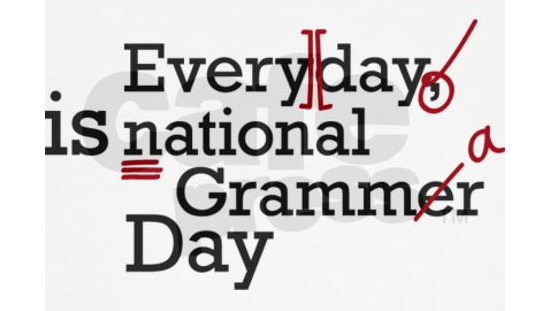March 4th is National Grammar Day! Now, it’s only the sixth year of this universally important holiday, so it’s especially paramount that grammar snobs join together and nurture this young celebration. We must foment superior communication and word snobbery, no matter how unpleasant it may make us at social gatherings. But why does grammar matter? And perhaps more importantly, why does it need a day? Shouldn’t we be using good grammar every day? Well, yes, but people aren’t. In this age of texting, of truncated language, of abbreviated meaning, we few — we happy, snarky few — must hold the line. As King Theoden lamented in The Two Towers — and I’m paraphrasing — “What can men do against such reckless word abuse?” Plenty!
National Grammar Day was created by author Martha Brockenbrough, who founded the Society for the Promotion of Good Grammar (or SPOGG). While it’s fun to think that “promotion” means that SPOGG goons seek out and punish grammar’s greatest offenders (teenagers with cell phones?), Brockenbrough did write questions for classic educational games like Trivial Pursuit and Cranium. The Society is fighting the good fight, and so must we all.
How should you “celebrate” National Grammar Day, then? Some websites will suggest that you buy word-related products (meh), send grammar e-cards (boring), or share hilarious grammatical screw-ups (okay, fun). The latter can be particularly satisfying — and is easily done through social media — but I submit to you there are more interesting ways to observe this most sacred of days.
Ultimately, good grammar is about good communication. Here, then, are my suggestions, any of which will make you a better person.
- If you send any texts today, use complete sentences, appropriate capitalization, and correct punctuation.
- Go out of your way to use some adjectives in your speech today or even — if you’re feeling especially brave — adverbs.
- Educate your friends about some grammar myths. Maybe we can dispel one or two today. Really, you can split infinitives and it’s okay to end a sentence with a preposition (most of the time).
- Rifle through a copy of The Elements of Style, or buy a copy if you don’t already have it.
- Better still, pick up a copy of one of the more obscure — but far more entertaining — grammar snob books, such as: The Deluxe Transitive Vampire: The Ultimate Handbook of Grammar for the Innocent, the Eager, and the Doomed, by Karen Elizabeth Gordon, Woe Is I: The Grammarphobe’s Guide to Better English in Plain English, by Patricia T. O’Conner, or Eats, Shoots & Leaves: The Zero Tolerance Approach to Punctuation, by Lynne Truss.
- Subscribe to Dictionary.com‘s or M-W‘s Word of the Day emails so that you, too, can use words like “amygdaliform” in your everyday life.
And remember, it’s okay to be an insufferable grammar snob today. You’re supposed to. Still, watch out for those SPOGG goons.
(Images courtesy of CafePress and the_munificent_sasquatch on Flickr)
http://www.chicagotribune.com/features/life/ct-tribu-words-work-national-grammar-day-20130304,0,2293710.story








